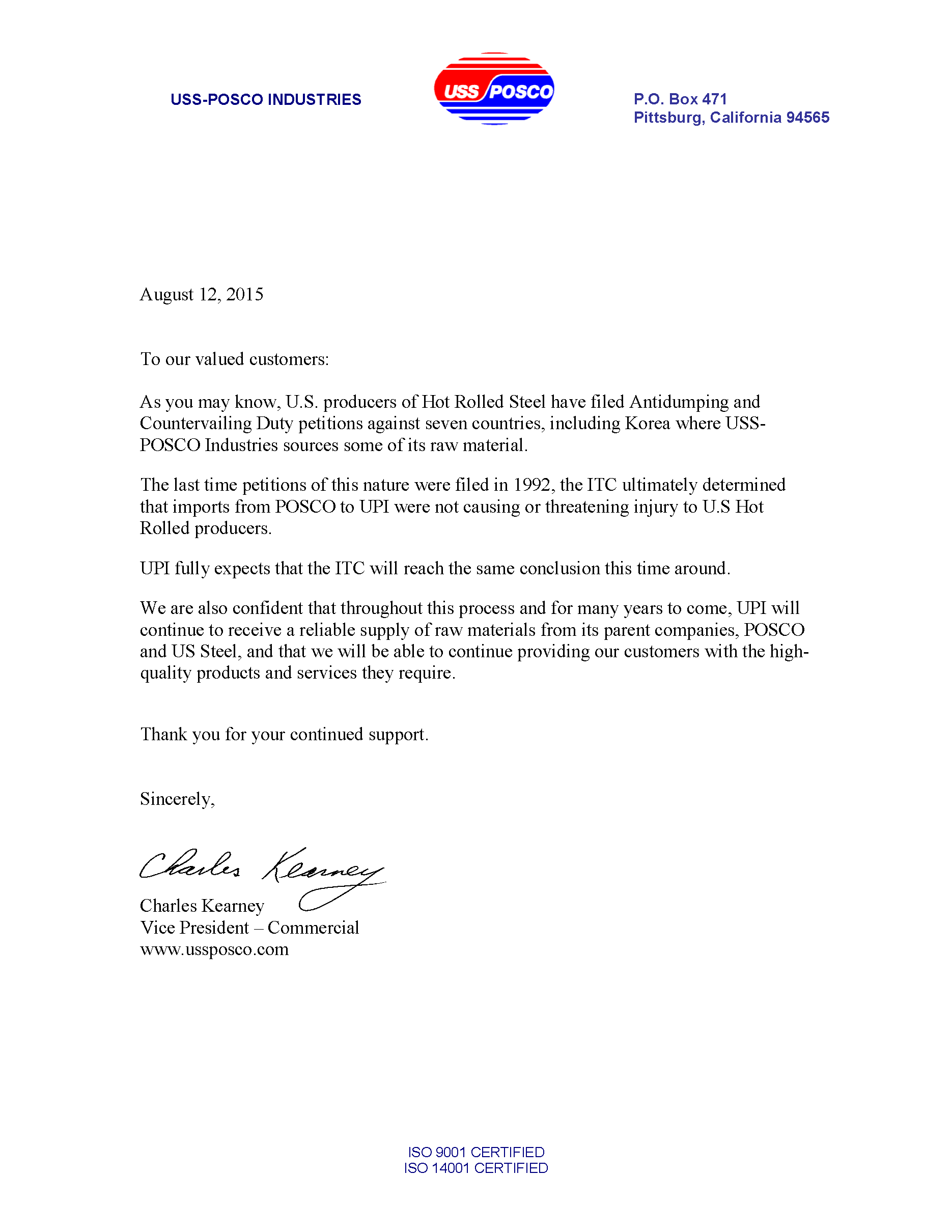Government/Policy

August 13, 2015
Will USS/POSCO and Steelscape be Hurt by Hot Rolled Trade Suit?
Written by John Packard
On Tuesday six steel mills located east of the Rocky Mountains filed an antidumping and countervailing duty petition against seven countries: Australia, Brazil, Japan, the Republic of Korea, the Netherlands, Turkey and the United Kingdom.
What makes this suit of particular interest to those on the West Coast USA is the source supply for two of the three flat rolled mills may be affected by this trade suit. The two mills are USS/POSCO and Steelscape. The third unaffected mill is California Steel which receives slabs from a number of the countries mentioned in the hot rolled suit. Semi-finished steels are not included in any of the antidumping suits filed to date (and none are expected).
USS/POSCO
USS/POSCO is a 50/50 joint venture between US Steel and POSCO out of South Korea. When the joint venture was formed the source hot rolled substrate needed to run the pickling, cold rolling and galvanizing operations was to come from each of the parent companies. Recently, the percentage of POSCO material has risen above the 50 percent level and the amount of USS substrate has fallen well below the 50 percent level.
Steel Market Update has spoken with two trade attorneys on the subject of POSCO, which is the largest steel company in South Korea, and if they are part of the trade case filed on hot rolled. We heard this from Lewis Leibowitz, “Historically, USS/POSCO has been exempted from hot rolled trade cases, including AD/CVD (1992) and the 2001 safeguard case. I looked quickly at the scope of the investigation and didn’t see any exemption that would fit (it would have width/thickness and chemistry features).”
We also asked one of the lead attorneys for the steel mills whether POSCO was involved in this trade suit and he responded, “Posco and all hot rolled sheet is covered by the Korean hot rolled cases.” When questioned further this attorney told SMU that his information is “100% accurate.”
SMU has been asking USS/POSCO if they have any comments on the subject and they have advised us that they are reviewing the situation. The company put out a letter to their customers which stated:
 “As you may know, U.S. producers of Hot Rolled Steel have filed Antidumping and Countervailing Duty petitions against seven countries, including Korea where USS-POSCO Industries sources some of its raw material.
“As you may know, U.S. producers of Hot Rolled Steel have filed Antidumping and Countervailing Duty petitions against seven countries, including Korea where USS-POSCO Industries sources some of its raw material.
The last time petitions of this nature were filed in 1992, the ITC ultimately determined that imports from POSCO to UPI were not causing or threatening injury to U.S Hot Rolled producers.
UPI fully expects that the ITC will reach the same conclusion this time around.
We are also confident that throughout this process and for many years to come, UPI will continue to receive a reliable supply of raw materials from its parent companies, POSCO and US Steel, and that we will be able to continue providing our customers with the high-quality products and services they require.” The letter was signed by Vice President for Commercial, Charles Kearney.
In calendar year 2014 the Port of San Francisco which handles the imports of hot rolled to USS/POSCO, received a total of 837,173 net tons of hot rolled. Of the total 687,965 net tons was from South Korea and the balance was from Australia at 72,441 net tons and Japan at 45,771 net tons. Turkey has 29,802 net tons and there were small amounts from South Africa, Germany and France. We cannot assume that the non-Korean material went to USS/POSCO as it could have gone to other customers in the area.
This evening we heard from one of the trade attorneys that it is not a given that POSCO will be excused from this trade case. We were told, “It will be tough. USS/POSCO can negotiate an exclusion… Petitioners (more than 85% of domestic production of the covered product) have to agree to an exclusion. USS would agree, obviously, but why would the others? A tough negotiation will ensue.”
Steelscape
SMU also reached out to Steelscape, which is a re-rolling mill in Kalama, Washington with a sister coating/paint line in Rancho Cucamonga, California. The mill was 100 percent owned by BlueScope Steel (Australia) and then in 2013 Nippon Steel & Sumitomo Metals Corporation entered into a joint venture with BlueScope Steel which included the Steelscape mills.
Steelscape focuses on value added products in the construction, metal building and roofing market segments. The company produces galvanized and Galvalume and much of their material is then continuous coil coated (painted) before being sold to the end users or distributors.
The substrate for Steelscape generally comes from their parent companies out of Australia and Japan. In 2014 the Columbia Snake port which handles steel substrate for Steelscape received 451,586 net tons. Of those Japan exported 292,548 net tons and Australia shipped 144,031 net tons. The minor balance remaining was from Korea 9,016 net tons and New Zealand was 5,485 net tons.
Of the four countries shipping into the Port of Columbia Snake all but New Zealand have been hit by the antidumping petition.
We have asked for comments out of Steelscape from a number of sources but as of this writing we have not received anything.
SMU Comment:
These two situations will be fluid for a number of weeks until the US Department of Commerce and ITC have a chance to review the petitions and responses from the various parties. We fully expect USS/POSCO and Steelscape to ask for an exemption on their sources of supply. As the USS/POSCO letter states in 1992 POSCO was found to have not been causing material injury to the domestic steel industry.
To put some better timing to the exclusion claim. One of the trade attorneys with whom we have been conversing on the subject of the various trade suits advised us this evening: “Scope comments will be due roughly 20 days after the notice of initiation is published. That will probably be on day 20 after the petition was filed—so 40 days after the filing of the petition; late September. If there is any ambiguity about whether USS/POSCO’s substrate is covered by the petition, it will be revealed in the scope comments.”







